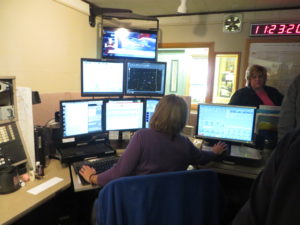
While many shops and offices are closed to help protect the public from COVID-19, emergency services are continuing to help our communities. Washington County 911 Supervisor Cara Sorrells explains that dispatchers across the country are now starting to ask additional questions on 911 calls related to novel coronavirus, “The dispatchers, the first responders, EMS, law enforcement, we’re still coming to work. We’re still here, emergency services do still exist, and we will still respond to emergency calls, but it’s important for us to protect those people. As soon as we start to get someone who has a positive test for that then it starts to degrade the response that you’re going to get. So, we have to be very careful. So, the reason we’re asking these questions is to make sure that there hasn’t possibly been somebody that’s been exposed to it so they can take the proper precautions.”
When a 911 call comes in, dispatchers will ask about symptoms, recent travel, and contact with anyone with respiratory symptoms so the first responders know what to expect when entering the home. Sorrells says responders may have additional protective gear on, “They will still respond to people’s houses, however the response might look a little bit different. Instead of the police officers, and the ambulance, and everybody coming up to the door, you’re probably going to get one responder initially depending on the nature of the emergency. And they’re going to be in a mask, they’re going to come to the door and start to make contact, and just assess the situation before everybody comes up. The goal is not everybody should be exposed if there is a potential problem.”
As of Tuesday, Iowa has 124 positive cases of COVID-19 with community spread identified. Of the positive cases four are in Washington County, 37 are in Johnson County, and one is in Henry County. People are encouraged to practice social distancing by staying home as much as possible, limiting contact with people outside the home by working remotely, using online options for daily life like curbside pickup for groceries or online bill payments, and calling ahead before going to a healthcare facility.

